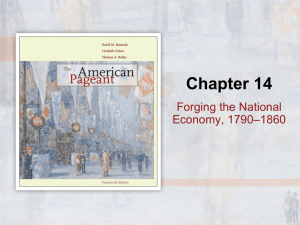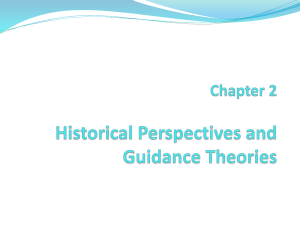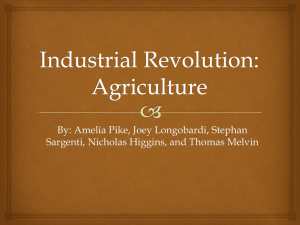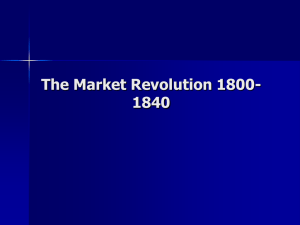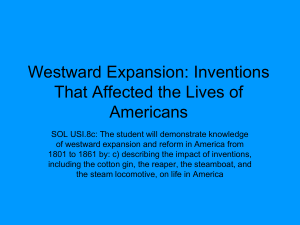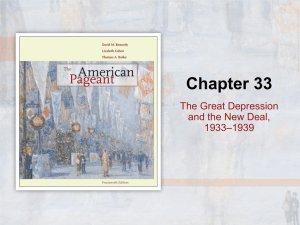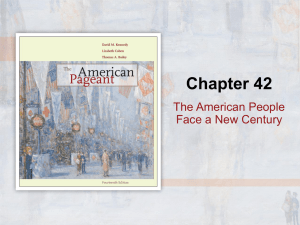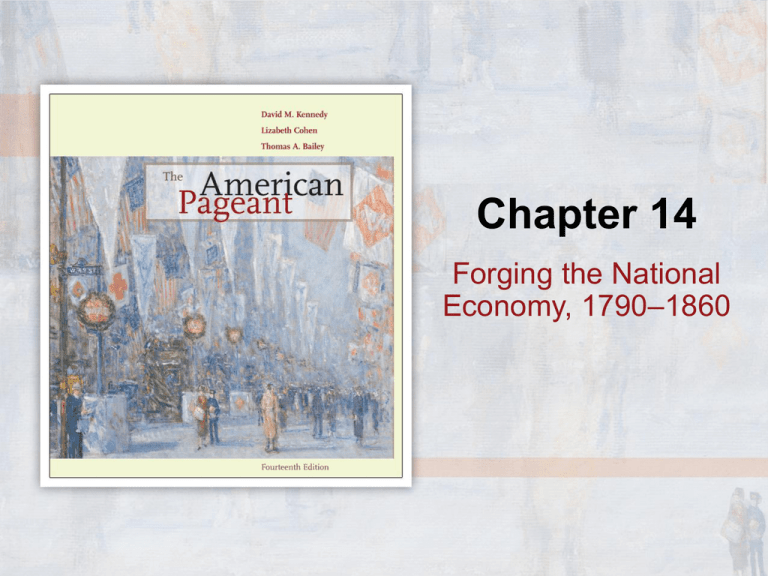
Chapter 14
Forging the National
Economy, 1790–1860
Question
All of the following beliefs characterized ecological
imperialism EXCEPT
a) the wild, unspoiled character of the land, especially in the West,
was deemed to be among the young nation’s defining
attributes.
b) no other nation had the pristine, natural beauty of America,
unspoiled by human hands and reminiscent of a time before
civilization.
c) an appreciative attitude toward wilderness became a kind of
national mystique, inspiring literature and painting, and
eventually conservation.
d) the United States had a God-given right to conquer and settle
the western frontier.
Copyright © Cengage Learning. All rights reserved.
14 | 2
Answer
All of the following beliefs characterized ecological
imperialism EXCEPT
a) the wild, unspoiled character of the land, especially in the West,
was deemed to be among the young nation’s defining
attributes.
b) no other nation had the pristine, natural beauty of America,
unspoiled by human hands and reminiscent of a time before
civilization.
c) an appreciative attitude toward wilderness became a kind of
national mystique, inspiring literature and painting, and
eventually conservation.
d) the United States had a God-given right to conquer and settle
the western frontier. (correct)
Hint: See pages 307–308.
Copyright © Cengage Learning. All rights reserved.
14 | 3
Question
The Molly Maguires were a/an
a) anti-immigrant party centered in New England in the
1850s.
b) woman’s suffrage organization which emerged after
Seneca Falls in 1848.
c) shadowy Irish miners’ union that rocked the
Pennsylvania coal districts in the
1860s and 1870s.
d) nascent, quasi-Masonic order comprised of ScotsIrish frontiersmen who settled Texas in the 1830s.
Copyright © Cengage Learning. All rights reserved.
14 | 4
Answer
The Molly Maguires were a/an
a) anti-immigrant party centered in New England in the
1850s.
b) woman’s suffrage organization which emerged after
Seneca Falls in 1848.
c) shadowy Irish miners’ union that rocked the
Pennsylvania coal districts in the
1860s and 1870s. (correct)
d) nascent, quasi-Masonic order comprised of ScotsIrish frontiersmen who settled Texas in the 1830s.
Hint: See page 311.
Copyright © Cengage Learning. All rights reserved.
14 | 5
Question
All of the following were true of the Irish in America
EXCEPT
a) New York’s political machine Tammany Hall came to be
dominated by immigrant Irish politicians.
b) Irishmen dominated police departments in many big cities.
c) Democratic politicians rejected the Irish vote, for fear of
alienating their powerful, reform-minded evangelical Protestant
constituency.
d) politicians often found it politically profitable to “twist the British
lion’s tail” to appeal to anti-British feelings among Irish votes.
Copyright © Cengage Learning. All rights reserved.
14 | 6
Answer
All of the following were true of the Irish in America
EXCEPT
a) New York’s political machine Tammany Hall came to be
dominated by immigrant Irish politicians.
b) Irishmen dominated police departments in many big cities.
c) Democratic politicians rejected the Irish vote, for fear of
alienating their powerful, reform-minded evangelical Protestant
constituency. (correct)
d) politicians often found it politically profitable to “twist the British
lion’s tail” to appeal to anti-British feelings among Irish votes.
Hint: See page 311.
Copyright © Cengage Learning. All rights reserved.
14 | 7
Question
The Know-Nothing party’s primary purpose was to
limit access to power and citizenship for
a) free blacks.
b) immigrants.
c) women.
d) Masons.
Copyright © Cengage Learning. All rights reserved.
14 | 8
Answer
The Know-Nothing party’s primary purpose was to
limit access to power and citizenship for
a) free blacks.
b) immigrants. (correct)
c) women.
d) Masons.
Hint: See page 314.
Copyright © Cengage Learning. All rights reserved.
14 | 9
Question
All of the following were true of the Cotton gin EXCEPT
a) Eli Whitney was told that the poverty of the South would be
relieved if someone invented a device for separating seeds
from short-staple cotton.
b) Whitney’s cotton gin was fifty times more effective than the
handpicking process.
c) almost overnight, the raising of cotton became highly profitable,
and the South was tied hand and foot to the throne of King
Cotton.
d) slavery was already on the rise, and the cotton gin’s production
of cotton cloth created a vibrant new slave
market in the North.
Copyright © Cengage Learning. All rights reserved.
14 | 10
Answer
All of the following were true of the Cotton gin EXCEPT
a) Eli Whitney was told that the poverty of the South would be
relieved if someone invented a device for separating seeds
from short-staple cotton.
b) Whitney’s cotton gin was fifty times more effective than the
handpicking process.
c) almost overnight, the raising of cotton became highly profitable,
and the South was tied hand and foot to the throne of King
Cotton.
d) slavery was already on the rise, and the cotton gin’s production
of cotton cloth created a vibrant new slave
market in the North. (correct)
Hint: See page 318.
Copyright © Cengage Learning. All rights reserved.
14 | 11
Question
Limited liability was significant for all of the following
reasons EXCEPT it
a) gave expansive rights to creditors in cases of legal claims or
bankruptcy.
b) aided the concentration of capital by permitting the individual
investor to risk no more than his own share of the corporation’s
stock.
c) meant that businessmen could create corporations without
applying for individual charters from the legislature.
d) revolutionized news gathering, diplomacy, and finance.
Copyright © Cengage Learning. All rights reserved.
14 | 12
Answer
Limited liability was significant for all of the following
reasons EXCEPT it
a) gave expansive rights to creditors in cases of legal claims or
bankruptcy.
b) aided the concentration of capital by permitting the individual
investor to risk no more than his own share of the corporation’s
stock. (correct)
c) meant that businessmen could create corporations without
applying for individual charters from the legislature.
d) revolutionized news gathering, diplomacy, and finance.
Hint: See page 321.
Copyright © Cengage Learning. All rights reserved.
14 | 13
Question
In Commonwealth v. Hunt, the Supreme Court ruled that
a) labor unions were not illegal conspiracies, provided
that their methods were “honorable
and peaceful.”
b) labor unions were illegal conspiracies, even if their
methods were “honorable and peaceful.”
c) factories could not exploit female workers unless
they guaranteed proper “moral education” for single
women.
d) strikes were legalized overnight.
Copyright © Cengage Learning. All rights reserved.
14 | 14
Answer
In Commonwealth v. Hunt, the Supreme Court ruled that
a) labor unions were not illegal conspiracies, provided
that their methods were “honorable
and peaceful.” (correct)
b) labor unions were illegal conspiracies, even if their
methods were “honorable and peaceful.”
c) factories could not exploit female workers unless
they guaranteed proper “moral education” for single
women.
d) strikes were legalized overnight.
Hint: See page 324.
Copyright © Cengage Learning. All rights reserved.
14 | 15
Question
All of the following were true of the cult of domesticity
EXCEPT
a) it was a widespread cultural creed that glorified the customary
functions of the homemaker.
b) from their pedestal, married women commanded immense
moral power, and they increasingly made decisions that altered
the character of the family itself.
c) upon marriage, women left their paying jobs and took up their
new work as wives and mothers.
d) parental “arrangement,” not love, more and more frequently
determined the choice of a spouse.
Copyright © Cengage Learning. All rights reserved.
14 | 16
Answer
All of the following were true of the cult of domesticity
EXCEPT
a) it was a widespread cultural creed that glorified the customary
functions of the homemaker.
b) from their pedestal, married women commanded immense
moral power, and they increasingly made decisions that altered
the character of the family itself.
c) upon marriage, women left their paying jobs and took up their
new work as wives and mothers.
d) parental “arrangement,” not love, more and more frequently
determined the choice of a spouse. (correct)
Hint: See page 325.
Copyright © Cengage Learning. All rights reserved.
14 | 17
Question
All of the following were true of the McCormick Reaper
EXCEPT
a) it undermined the Southern cotton economy by introducing
mass production of an alternative staple crop, which needed
very little slave labor.
b) McCormick invented a mechanical reaper near his home in
Virginia in 1831.
c) the reaper was best suited to the horizonless fields of wheat on
the rolling prairies of the Midwest.
d) by the 1850s, McCormick’s Chicago factory was cranking out
more than twenty thousand reapers a year for midwestern
farmers.
Copyright © Cengage Learning. All rights reserved.
14 | 18
Answer
All of the following were true of the McCormick Reaper
EXCEPT
a) it undermined the Southern cotton economy by introducing
mass production of an alternative staple crop, which needed
very little slave labor. (correct)
b) McCormick invented a mechanical reaper near his home in
Virginia in 1831.
c) the reaper was best suited to the horizonless fields of wheat on
the rolling prairies of the Midwest.
d) by the 1850s, McCormick’s Chicago factory was cranking out
more than twenty thousand reapers a year for midwestern
farmers.
Hint: See page 328.
Copyright © Cengage Learning. All rights reserved.
14 | 19
Question
All of the following were true of the Erie Canal EXCEPT
a) New Yorkers dug the Erie Canal, with massive
federal aid, in order to link the Great Lakes with the
Hudson River.
b) New Yorkers were led by Governor DeWitt Clinton,
whose grandiose project was scoffingly called
“Clinton’s Big Ditch.”
c) the value of land along the route skyrocketed.
d) new cities, such as Rochester and Syracuse,
blossomed as a result of the canal.
Copyright © Cengage Learning. All rights reserved.
14 | 20
Answer
All of the following were true of the Erie Canal EXCEPT
a) New Yorkers dug the Erie Canal, with massive
federal aid, in order to link the Great Lakes with the
Hudson River. (correct)
b) New Yorkers were led by Governor DeWitt Clinton,
whose grandiose project was scoffingly called
“Clinton’s Big Ditch.”
c) the value of land along the route skyrocketed.
d) new cities, such as Rochester and Syracuse,
blossomed as a result of the canal.
Hint: See pages 329–330.
Copyright © Cengage Learning. All rights reserved.
14 | 21

